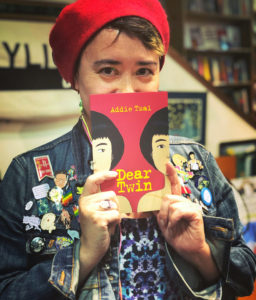
An Open Book
Addie Tsai’s young-adult novel recounts her queer awakening in Montrose.

Queer and non-binary writer Addie Tsai’s young-adult (YA) novel, Dear Twin, tells a story not often found on bookshelves: that of a queer, Asian, teenage twin named Poppy Uzumaki. To top it off, this Space City-native, who uses she/her pronouns, has set her novel in Houston’s Montrose neighborhood—a place also not often featured in literature.
“I think it’s important to tell the stories of people that aren’t being told—queer Asians, twins, and young-adult characters that experience traumatic upbringings. As is the case with many writers before me, when I couldn’t find myself on the shelf, I decided to write myself onto the shelf instead,” says the author.
Tsai, 40, is quite familiar with the iconic Houston neighborhood where she set Dear Twin. She grew up in Clear Lake, and for her, Montrose was one of the first queer communities she encountered.
“I think it’s important to tell the stories of people that aren’t being told—queer Asians, twins, and young-adult characters that experience traumatic upbringings.”
“There’s a couple of reasons I set it partially in Montrose. First of all, I think we as readers are always looking to find ourselves and some part of our experiences in the art we consume, whether that be a book, a film, a dance performance, or a theater piece. Aside from Bryan Washington’s Lot, I have found it very difficult to find any external representation of Houston. So I wanted to reflect the world that I came from—the first queer environment I ever witnessed and was part of. I also wanted to widen [my readers’] ideas of what Houston is like, which I feel is often misrepresented in popular culture,” says Tsai.
The novel tells the complex story of 19-year-old Poppy, whose mirror-twin sister, Lola, recently and mysteriously vanished. As a result, Poppy’s dreams of going to college and escaping to a brighter future with her girlfriend, Juniper, are put on hold by her depressed father, who forces her to stay close to home. Poppy begins writing letters to her wayward sister in hopes of convincing her to return home—and also, perhaps, to procure Poppy’s freedom.
Fellow author C.B. Lee says Tsai’s novel “deftly navigates the complicated feelings of sisterhood, twinhood, and sharing a face and a part of your soul with someone, and how that changes when they disappear.”

“This is an autobiographical story, so I wanted to share parts of my story [while giving] a complexity to the representation of twins and of queer Asians in a way I hadn’t seen depicted, especially in YA literature,” says Tsai of her inspiration.
Although categorized in the young-adult genre, Tsai’s audience is clearly broader than that. Her novel weaves together experiences both typical and unique, creating a rich and relatable tapestry for the reader to enjoy.
“I wrote this book particularly to have cross-genre potential. But generally speaking, I wrote this for twins, I wrote this for queer Asians, I wrote this for those who live in liminal spaces in their identities, and I wrote this for those teens (or adults) who have struggled in their youth. I wanted them to feel seen and witnessed,” Tsai explains.
Tsai has plans for her Dear Twin characters to appear in a sequel to the novel that she is currently working on. The author is also jumping genres again with a new adaptation of the classic horror story Frankenstein.
“I write in a lot of genres! I write in fiction, poetry, nonfiction, and what I’d call hybrid work. But I’d like to work more in video and text, and I’d love to figure out how to write a screenplay one day. I dabble in photography, and I’d love to get more confident and proficient at working in that medium,” says Tsai of her many interests.
Readers can find Tsai’s work on Foglifter, and her older work appears on her website at addietsai.org.
This article appears in the May 2020 edition of OutSmart magazine.










